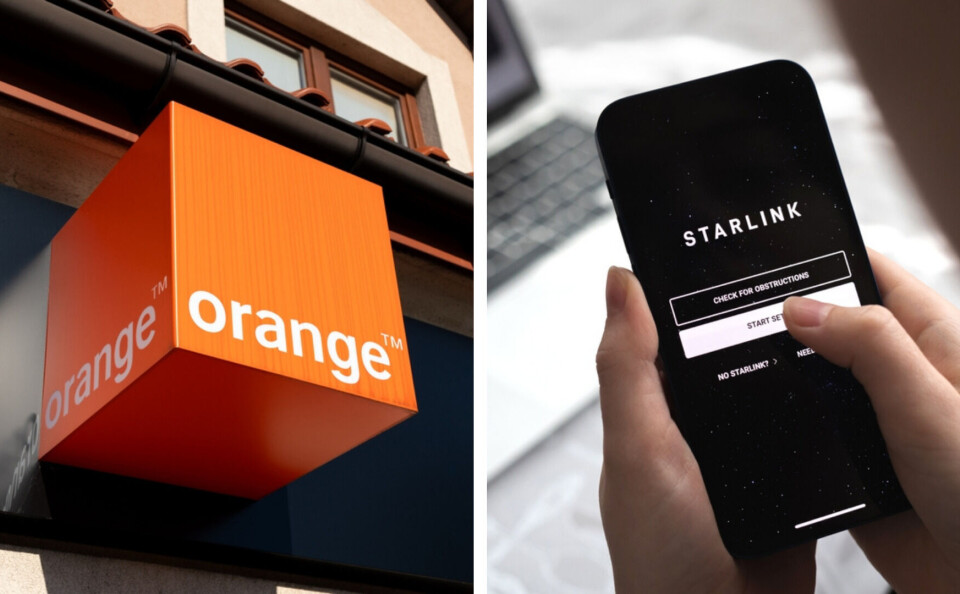-
Nestlé baby formula recall: French authorities criticised over response time
One infant died after drinking the formula although no causal link has officially been identified
-
French farmers begin major protest in Strasbourg
More than 700 tractors expected to park outside EU Parliament in two-day protest
-
Prime Minister to force 2026 budget through without a vote
Use of controversial Article 49.3 opens government up to vote of no confidence but opposition MPs unlikely to find enough support
Orange to offer French satellite internet service ‘to rival Starlink’
It will be aimed mainly at people living in remote areas who cannot otherwise access high-speed internet. Rates will be €49.99 a month

The French phone and internet provider Orange is to revamp its satellite internet service and create a new service which could offer an alternative to Starlink, Elon Musk’s worldwide satellite internet platform.
Orange unveiled the plans on November 16 in partnership with its high-speed internet provider Nordnet, positioning the service as a competitor to Starlink.
The service is in effect a major overhaul of Orange's previous satellite internet offering, also with Nordnet, which has existed since 1999, and at one point had 25,000 customers.
Aimed at rural customers
The network said that the offer is particularly aimed at customers who are not eligible for fibre and those with low ADSL speeds.
It said it could be a transitional service, to help customers who are still waiting to be connected to fibre, to still have access to very high-speed internet.
“There is a growing demand among the general public for access to very high-speed broadband,” said Lætitia Orsini Sharps, Consumer Director at Orange France, to Le Figaro. “Fibre is still the best technology, and we have 4G/5G Home solutions for the home, but satellite is sometimes the best answer.”
Read more: Fibre broadband is still lacking in much of France: where and why?
How much, and how fast?
Orange is set to offer the service for €49.99 per month, plus a satellite kit for €299 upfront, or €8 a month to rent. Customers can install the kit themselves, or pay an Orange partner to do it for them, for an installation fee of €299.
Download speeds will be up to 200Mbps, and uploads up to 15Mbps upstream, with no data limit. The package will also offer unlimited calls to landlines and mobiles in several destinations.
Previous Nordnet services were limited to offering 100Mbps speeds; whereas now, it can offer up to 200Mbps thanks to a new satellite, the Eutelsat Konnect VHTS, which was launched in September 2022. The satellite was designed in Cannes and is operated from Europe.
How does Starlink compare?
Sector analyst Antoine Lebourgeois told Le Figaro that Orange has refused to be drawn into a “price war with Starlink”, and will “prefer to fight over the quality of the offers”.
The Eutelsat Group and Starlink will “coexist”, said Orange CEO, Jean-François Fallacher.
Starlink, Elon Musk’s equivalent satellite internet offer, launched in France in 2021. Perhaps in anticipation of Orange’s new service, Starlink slashed its kit price from €450 to €199 in July (although it has now gone back to the original price).
The subscription price, however, which was €50 a month, also decreased (to €40 a month), and this has not changed since.
Read more: Starlink satellites bring Wi-Fi to rural France
Starlink’s satellites are in low orbit, between 550 and 1,200 km away, compared to Eutelsat’s satellites, which are in ‘geostationary orbit’, around 35,000 km from Earth.
This means that Starlink offers a shorter latency time (the time it takes for data to travel).
The latency times are small but significant, said Mr Lebourgeois. Geostationary satellites have a delay of 700 milliseconds, he said, “whereas Musk promises a latency of between 50 and 100 milliseconds, the equivalent of a terrestrial connection”.
Both types of coverage are dependent on weather conditions, however.
“The fact that Eutelsat is a geostationary satellite guarantees very good quality bandwidth stability,” said Ms Orsini Sharps, at Orange.
Orange will also be hoping to capitalise on the recognisability of its brand in France, and the strength of its distribution network; plus its close knowledge of the country, and areas where fibre coverage is not optimal.
“This service will be offered in our 560 shops [nationwide], but will probably be promoted more heavily in these [remote] areas,” said Ms Orsini Sharps.
Related articles
Musk’s Starlink internet growing popular in France: Your experiences
Where internet broadband speed is best in France
High-speed Starlink satellite internet access now available in France
























